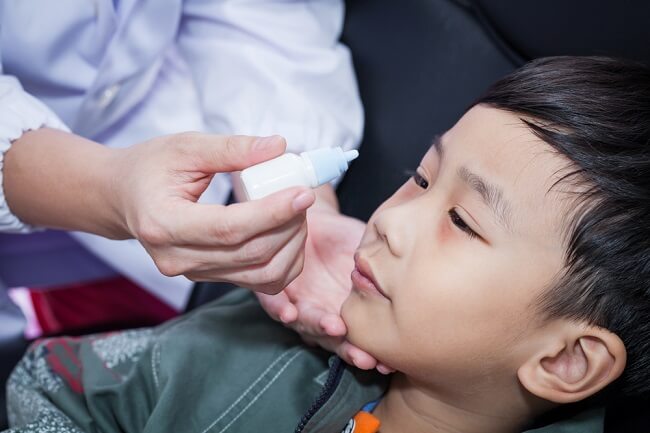Ribavirin is an antiviral drug used to treat hepatitis C. Ribavirin is used in combination with other antiviral drugs, such as interferon or sofosbuvir. This drug works by reducing the amount and stopping the spread of the hepatitis C virus in the body.
Although it can reduce the amount of hepatitis C virus, until now ribavirin has not been able to prevent liver damage, cure hepatitis C, or prevent hepatitis C transmission. To prevent hepatitis C transmission, patients are still advised to use condoms during sexual intercourse and not to share needles that are shared same as other people.

In addition to being used to treat hepatitis C, ribavirin is also sometimes used to treat dengue fever and pneumonia severe acute respiratory syndrome (SARS).
Trademarks of ribavirin: Copegus and Rebetol
What is Ribavirin?
| group | Anti Virus |
| Category | Prescription drugs |
| Benefit | Treating hepatitis C |
| Used by | Adults and children |
| Parnaparin for pregnant and lactating women | Category X: Studies in experimental animals and humans have demonstrated fetal abnormalities or a risk to the fetus. Drugs in this category are contraindicated in women who are or may become pregnant. It is not known whether ribavirin is absorbed into breast milk or not. If you are breastfeeding, do not use this medicine without consulting your doctor first. |
| Drug form | Tablets and capsules |
Warnings Before Using Ribavirin:
- Do not take ribavirin if you have a history of allergy to this drug.
- Tell your doctor if you have ever had kidney disease, liver disease, hypertension, gastrointestinal disorders, pancreatitis, diabetes, HIV/AIDS, thyroid disorders, sarcoidosis, or blood disorders, such as sickle cell anemia, anemia, thalassemia, and hemoglobinopathies
- Tell your doctor if you are pregnant, breastfeeding, or planning a pregnancy.
- Tell your doctor if you have a history of alcoholism or if you frequently use certain drugs without a prescription.
- Do not drive a motor vehicle, control heavy equipment, or perform activities that require alertness, while taking ribavirin. This medicine may cause dizziness, extreme tiredness, or blurred vision.
- Tell your doctor if you are taking any other medicines, including herbal medicines and supplements.
- See your doctor immediately if you have an allergic reaction or overdose after taking ribavirin.
Dosage and Rules for Use of Ribavirin
Ribavirin should be used in combination with other antiviral drugs, such as interferon alfa-2a, peginteron alfa-2a, or sofosbuvir. The dose of ribavirin given is determined based on the age and weight of the patient and the condition being treated. Here is the dosage distribution:
Condition: Chronic hepatitis C
Dosage: 400 mg 2 times a day every morning and evening for 24 weeks.
Condition: Hepatitis C accompanied by HIV
Dosage: 800 mg daily for 48 weeks.
In addition to the condition, the dose can also be given based on the patient's age and weight, as well as the ribavirin trademark. The division is as follows:
Rebetol for adults:
- Body weight <65 kg: 400 mg 2 times a day every morning and evening
- Body weight 65–80 kg: 400 mg in the morning and 600 mg in the afternoon
- Body weight 81–105 kg: 600 mg 2 times/day every morning and evening
- Body weight >105 kg: 600 mg in the morning and 800 mg in the afternoon
Copegus for adults:
- Body weight <75 kg: 400 mg in the morning and 600 mg in the afternoon
- Body weight 75 kg: 600 mg 2 times a day in the morning and evening
Rebetol for kids:
- Body weight <47 kg: 15 mg/kg/day in 2 divided doses
- Body weight 47–49 kg: 200 mg in the morning and 400 mg in the afternoon
- Body weight 50–65 kg: 400 mg 2 times a day every morning and evening
How to Use Ribavirin Correctly
Follow the doctor's advice in taking ribavirin and always read the instructions for using the drug before taking it. Do not change the dose or duration of use of the drug without consulting your doctor first.
For ribavirin tablets, take the medication with food. While ribavirin capsules can be taken with or without food, with a note the drug must always be taken in the same way.
Use the given ribavirin until it runs out even if the symptoms have subsided. Do not stop using the drug suddenly because it can cause a recurrence of the infection.
Drink plenty of water while taking ribavirin to reduce the risk of side effects. To obtain maximum results, use ribavirin regularly and regularly. It is recommended to take ribavirin at the same time each day to prevent forgetting.
If you forget to take ribavirin, do so immediately if the break with your next schedule is not too close. If it is close, ignore it and do not double the dose.
Store ribavirin in a closed place at room temperature and away from heat and humidity. Keep out of reach of children.
Ribavirin Interactions with Other Drugs and Ingredients
Ribavirin can cause a number of interactions when used with other medicines. Interaction effects that can occur include:
- Enhanced immunosuppressant effect when used with azathioprine
- Increased risk of poisoning the inside of cells (mitochondrion) and lactic acidosis in HIV patients who use drugs nucleoside reverse transcriptase inhibitor (NRTIs), such as stavudine
- Increased risk of anemia, if used with zidovudine
- Decreased effectiveness of ribavirin when used with antacid products containing magnesium (Mg), aluminum (Al), and simethicone
Ribavirin Side Effects and Dangers
The following are the most commonly experienced side effects after using ribavirin:
- Nauseous
- Diarrhea
- Stomach ache
- Headache
- Dizzy
- Blurred vision
- Hard to sleep
- Dry skin
- Cough
- Weight loss or gain
- Changes in the sense of taste or hearing
Check with your doctor if these side effects don't go away for a long time or get worse. Although rare, a number of other, more serious side effects can also occur, such as:
- Extreme fatigue
- Muscle or joint pain
- Easy bruising
- Dark urine or bloody stools
- Yellow eyes and skin (jaundice)
- Heart beat
- Chest pain, abdominal pain, or lower back pain, which is severe
Immediately consult a doctor if you experience side effects as mentioned above. Examination also needs to be done immediately if an allergic reaction occurs, which includes an itchy rash, difficulty breathing, and swelling of the eyelids and lips.









